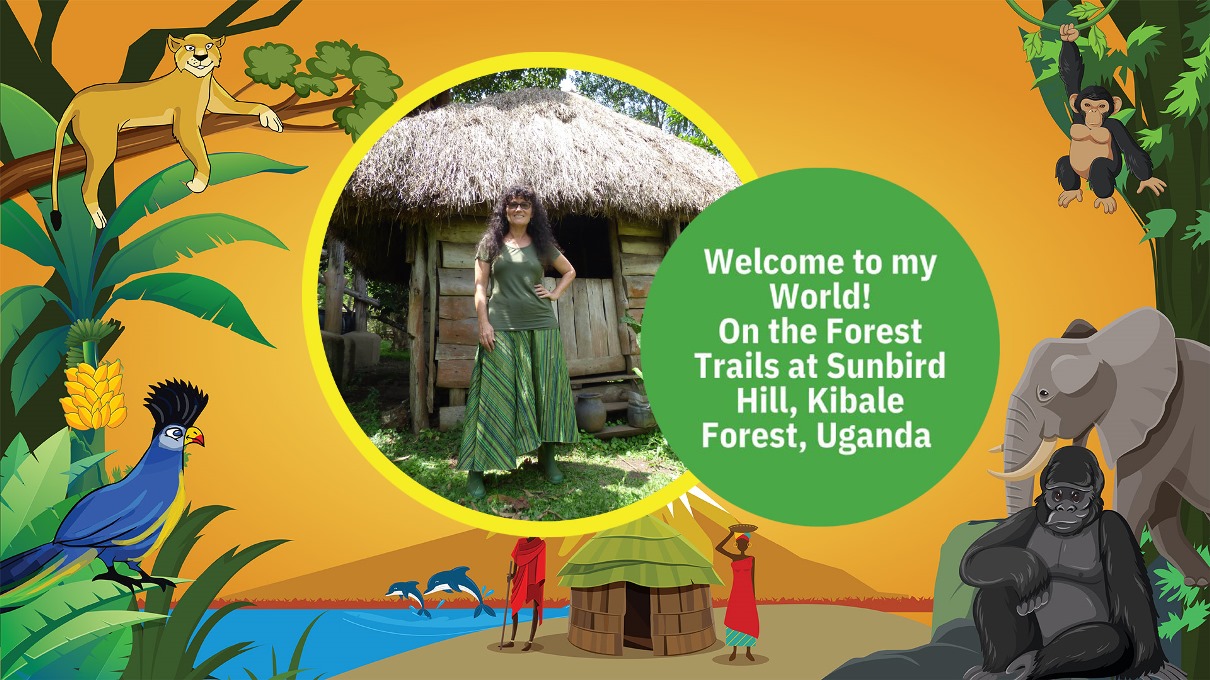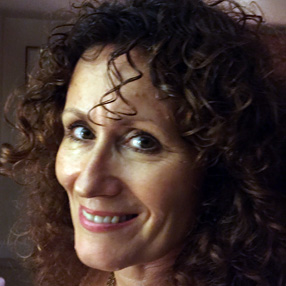The East Africa Travel Podcast. Episode 1
[00:00:00] My name is Charlotte Beauvoisin, author of Diary of a Muzungu, and you’re listening to the East Africa Travel Podcast. Episode 1.
[00:00:13] Welcome to my world, which today is on the edge of the tropical Kibale Forest, a national park of nearly 800 square kilometers in western Uganda.
[00:00:22] In this episode, we’re going to explore the trails at Sunbird Hill on the edge of the forest.
[00:00:27] We might go as far as the elephant trench.
[00:00:31] I’m going to tell you all about what inspired me to start this podcast, what I’m doing in Uganda, and I’ll tell you why locally I’m known as Nagawa of Nkima clan, and what that curious traditional name means.
[00:00:48] And for those of you who haven’t met me before, I’ll introduce you to my blog: Diary of a Muzungu which is dedicated to conservation, travel and adventure in East Africa.
What’s a Muzungu I hear you ask? Listen in to find out.
[00:01:10] It’s afternoon and I am sitting on a trail on the edge of the forest. I was getting a bit frustrated by some of the background noises around my house today and I thought, you know what, I need a change of scene and where is my favourite place? Where is the place I spent almost more time than anywhere during lockdown? And that is on the forest trails here at Sunbird Hill.
[00:01:39] Chimpanzees are around, so I really hope they don’t come walking down the trails. It’s not impossible, but they will probably hear me talk and not come this far. But let’s wait and see. I’m sitting on a rucksack – we do have ants, but I haven’t seen any today – but yes, there could be all kinds of pant hoots, screeches, and goodness knows what else.
[00:02:04] It’s a beautiful day. There are a lot of really beautiful butterflies around today. I saw an African Map. I’ll put a picture of it on social media. It’s a a gorgeous creature. I’ve just seen a Flying Handkerchief, a big pale yellow forest butterfly float by. Wow! The butterfly that’s flying past me at the moment is so large that I could feel the wind move as it flew by me.
[00:02:35] I sometimes think of my house as just being a glorified bird hide. I was sitting at my desk the other day and a hornbill almost flew in. It flew onto the handrail outside just a couple of metres away. I’m not sure who was more surprised, me or the bird actually, so I always keep my camera right next to my desk because you never know what you’re going to see.
[00:03:01] One time I looked up to see a lizard buzzard, a very pretty, pale grey raptor, land on a branch, just literally two or three metres from my desk, with a snake in one claw. And so I just watched it, fifteen minutes of it pulling this snake apart, just from my bird hide office. I am extraordinarily lucky to be here.
[00:03:29] I’m here by accident in many ways. I’d lived in Kampala for nearly 10 years, very happily. I will be sharing with you some of my early stories of my life here in Uganda, but I’ve been living ‘up country’ as we call it for nearly five years now.
The East Africa Travel Podcast is born out of my own love of podcasts, but also my realisation about how magical the sound is, the backdrop to our lives here in Uganda, and how unusual it is, but it’s ever present.
[00:04:04] Even if you live in Kampala, we have beautiful tropical birds and whether it’s the Ross’s turaco, the African grey parrot, the eastern grey plantain-eater, all these big tropical birds are everywhere. The sacred ibis, the Hadada ibis, these big, bold birds that make birdwatching really fun and really easy, actually.
[00:04:29] I’ve always liked birds, thanks to my dad and his dad. And, you know, if you like birds, if you appreciate them, then every time you hear a bird song, it really talks to you, it makes you happy. Well, I could go on and on about birds, but they really inspire me and it’s one of the ways that you really notice the difference between Uganda and say the UK, where I’m from.
[00:04:57] In UK, you’re very lucky if you see a kingfisher. It’s a beautiful bird, but there’s only one kind of them. Whereas here, there are eight different species or something like that so that’s a measure of the biodiversity here. I’ve had many friends who have come to Uganda to see lions and gorillas, but they say “you know what? I’ve never noticed birds before, but actually they’re quite cute, aren’t they? They’re quite interesting.” And again, that’s a measure of how diverse this country is and how accessible it is if you like wildlife. Anyway, as you can hear, I can wax lyrical endlessly about birds and the natural attractions of Uganda.
[00:05:45] So what am I, a British woman doing here in the middle of Africa? Well, it’s funny. I have wanted to live in Africa since I was a teenager and I finally moved here in 2009. I came here on a two year contract as a volunteer working in conservation. I just didn’t see myself as somebody coming here on a package holiday and I knew that I wanted something deeper.
[00:06:11] I wanted a deeper, broader experience, and that’s what I got with Voluntary Service Overseas. And it’s been life-changing. It’s opened up so many opportunities for me. It’s been difficult, of course. There are so many things that you find difficult about transitioning to working in a different culture but the sun shines here nearly every day. It’s a very easy country for an English speaker. I knew nothing about Uganda. I mean, I knew the same as most people, which is that there was this guy called Idi Amin, who ruled, and it didn’t end well, that there’s this lake called Lake Victoria. I’d also heard about the mountain gorillas, but honestly speaking, did I know they were in Uganda (or where did I think they were?)
[00:07:03] I can’t even remember. So when I came here, Uganda was a blank canvas to me, but I’d waited a couple of years before I finally got the job offer I wanted and I knew that I wanted to come and live in sub-Saharan Africa. I was offered jobs in Ghana and Cameroon and then this job offer came up in Uganda and it just seemed like me.
[00:07:27] It was working with the Uganda Conservation Foundation, a British charity that works to stop elephant poaching and to address human wildlife conflict, which is basically where humans retaliate and try and kill animals because the animals have been stealing their crops. It just sounded like my dream job.
[00:07:48] I was in such a rush to start my new life after all these months of planning that I just came here on this, what can I say, but a wave of good feeling about Uganda. Everyone I spoke to, volunteers who’d lived here before me, said, “Just go to Uganda, you’ll love it.” And they weren’t wrong.
[00:08:15] I’m so busy talking away to you that I’ve forgotten where I am, which is sitting on a path on the edge of the forest. I’m at Sunbird Hill, which is private land, bordering the National Park. I am just a few metres from the elephant trench, which runs along the side of Sunbird Hill land and borders Kibale National Park. Of course, the elephants can easily leave the park and then cross over the fields into our neighbours’ land.
[00:08:38] We do have elephants on the land, but at night… I just got a bit spooked then thinking I was sitting on a path and an elephant might appear! But it’s three o’clock in the afternoon so they won’t be out until six or later. They’re quite seasonal as well. We might hear them every night for a few weeks and then we won’t hear them for ages.
[00:09:06] You don’t hear the elephants themselves very often, but you sometimes hear the breaking of branches or the crack, crack, crack splintering of wood, which is always exciting, especially if I’m lying in bed and I think “Oh my God, that’s a bit close!” I’ve even lain in bed, hearing an elephant breathe.
We do have a big fence all the way around our compound.
[00:09:35] We can’t see the elephants. It’s very rare indeed that we do see them, but you know, when it breathes, it echoes through this cavernous body. It’s very exciting.
[00:09:51] There is something above my head. It’s probably a monkey. I’m just going to look up.
[00:10:06] It’s a red tailed monkey, Nkima. Oh, it’s talking to me, scolding me, warning me.
[00:10:20] Nkima is a particular favourite of mine. My local name is Nagawa. It’s a Kiganda name and it means that I am the protector of the red tailed monkey. And what that means in local culture is that I can’t kill it and I can’t eat it. We’ll talk more on another episode about the totems of Buganda, one of the traditional kingdoms around Kampala area.
[00:10:47] The East Africa Travel Podcast is an extension of Diary of a Muzungu, a blog that I’ve been writing ever since I decided to come on this big lifetime journey to Uganda.
And why Diary of a Muzungu? Well, when I was researching Uganda, I kept coming across this word, Muzungu. Everywhere I looked, I saw it, and I quickly came to realise that I’m always going to be called Muzungu because I’m white – and it’s not a bad thing.
[00:11:22] It’s not a judgment. It’s just we look different, we act differently. It comes from the Kiswahili and it was the name given to the first white people who landed on the coast of East Africa because we apparently got off the boat looking rather dazed and confused and we would wander around aimlessly.
[00:11:45] I decided – you know what – I’m going to get called this name, I’ve just got to embrace it. We have a lot of fun with it.
I run sometimes with the Kampala House Harriers and we go to all kinds of places. We can be running through the back streets, across the golf course, through some kind of shanty towns.
[00:12:03] Ugandan kids are so friendly and always want to say hello to everyone. And you know, you’ll be running along breathless, thinking “Oh God, I’ve had enough. I’m going to walk now.” And these kids come running along next to you. “Muzungu! Muzungu! Muzungu!” How can I stop running? I’ve got to keep going. So literally, sometimes you have dozens and dozens of kids going “Muzungu! Muzungu! Muzungu! How are you?”
It’s now starting to rain. Well, that’s an interesting development. Oh, I think I might have to move.
Well, we’ve done it. We’ve reached the end of the very first episode. Woohoo!
You have been listening to the East Africa Travel Podcast with me, Charlotte Beauvoisin, author of Diary of a Muzungu. If you have any questions or comments, I’d love to hear from you. Please get in touch.
Stay tuned for more sounds from the jungle!
Tune to The East Africa Travel Podcast for the dawn chorus, travel advice, chats with award-winning conservationists, safari guides, travellers (and wacky guidebook writers!)
- Sign up to my newsletter.
- Follow on Apple, Spotify & all podcast directories.
- Follow Charlotte Beauvoisin, Diary of a Muzungu on Instagram, Facebook, LinkedIn and Twitter.
- Got a question, I’d love to hear from you!
- Send an email or a voice note.
Stay tuned for more sounds from the jungle!
On the forest trails at Sunbird Hill, Kibale Forest, Uganda
Come with me on a short walk along the edge of the tropical Kibale Forest in western Uganda, where I introduce you to my life:
- What is a muzungu?
- What did volunteers tell me about Uganda?
- What’s an elephant trench?
- Why do I call my wooden house a “glorified bird hide”?
- Where is Sunbird Hill?
Scroll down for a full transcript of this week’s episode.
Tune to The East Africa Travel Podcast for the dawn chorus, travel advice, chats with award-winning conservationists, safari guides, travellers (and wacky guidebook writers!)
- Sign up to my newsletter.
- Follow on Apple, Spotify & all podcast directories.
- Follow Charlotte Beauvoisin, Diary of a Muzungu on Instagram, Facebook, LinkedIn and Twitter.
- Got a question, I’d love to hear from you!
- Send an email or a voice note.
Stay tuned for more sounds from the jungle!















Great start to a great idea and venture … happy to listen to the podcast like I liked your narratives during the pandemic lockdown ‘From the Edge of the Forest’ …
I wish you all the success you deserve for your latest project …
Having spent time in Uganda myself, I’ve been really enjoyed your podcasts in recent days. You’ve got a really natural way of talking and the guests you’ve had on have been great – I particularly enjoyed hearing Rob Walker who was so passionate about Uganda. It makes me really excited for our forthcoming trip back to Uganda.
Keep it up!!
Thanks for tuning in Alan!
As you heard in my conversation with Rob Walker, I always say people “like us stay in UG – or we come back!” So excited for you all to be revisiting the Pearl of Africa this summer. I really enjoyed organising your trip with you. Can’t wait to hear all about it. Lots of love from the forest x
hope you enjoyed
I’ve just started listening to your podcasts — (Episode 1) — and look forward to catching up on all the others, Charlotte. Fascinating. You’re as good and as professional with the spoken word as you are with writing, and your enthusiasm is infectious.
Coming from a couple of dam sites further up country, we used to stay in Kampala (Naguru), and I will never forget the joyful screech of African Greys as they circled around our hill. My Dad had a part-time-caged (featherless) African Grey, so seeing the freedom of these wild birds was something amazing, as, too, all the other birds living in this amazingly vibrant city.
Thanks for putting in the time and effort, helping us to learn and appreciate so many aspects of Uganda.
Dear Ingrid, how lovely to hear from you. It’s been a while!
Thanks so much for taking the time to listen – and to share your impressions.
One of the things I’m really enjoying about the podcast is getting a glimpse into other people’s lives. Thanks for sharing your memories.
It’s interesting how often we hear African Greys in Kampala. It doesn’t necessarily mean there are a lot of them, only that they are LOUD!
One of the next episodes is all about African grey parrots. We have a number of parrot monitoring programmes in Kibale Forest. I’m sure you’ll enjoy that episode, with Rowan Martin who heads the Africa programme for the World Parrot Trust and parrot-lover Nick Byaba, one of the site guides at Sunbird Hill.
I love the way you make the interviews fun with little giggles. The background sounds are delicious. Close your eyes and we are in the forest with you!
When I have to laugh at the craziness of it all – I mean, lying in bed listening to chimpanzees? Bats flying in and out of my house? Being woken up by elephants knocking down trees?! It’s nuts, innit!